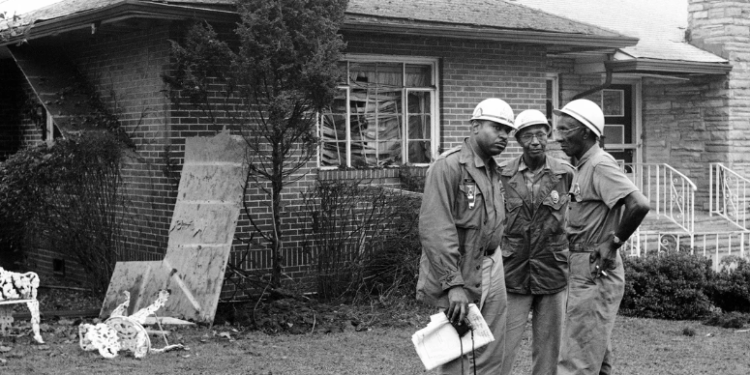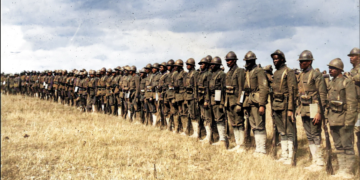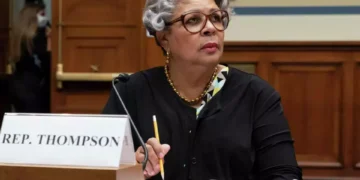Feb 8, 2025 Story by: Editor
Years before the 1963 Civil Rights marches brought national attention to Birmingham, Alabama, Black families on a single residential street were quietly resisting Jim Crow segregation—and facing severe repercussions. As part of a series revisiting pivotal moments from 50 years ago, NPR’s Debbie Elliott explored Birmingham’s Dynamite Hill.
The origins of modern Birmingham’s racial struggles can be traced to Center Street, a tree-lined hill with well-kept brick ranch-style houses. In the 1940s, this street marked the city’s racial boundary—white families lived on the west side, while the east side was undergoing demographic change.
Breaking the Color Barrier
Standing atop the hill, Jeff Drew recalls the tension when Black families first attempted to move across the divide.
“If you wanted to get a house on the west side of Center Street chances are you were going to have some resistance from white folks,” Drew says.
Despite the hostility, Drew’s family and other Black professionals settled on the west side, determined to challenge one of America’s most segregated cities. Initially, the Ku Klux Klan responded by burning the doors of homes purchased by Black residents. The violence escalated as Klan members fired shots into houses during the night.
“Those big cathedral windows were what were being shot at all of the time,” Drew recalls.
Bombings soon followed. Drew remembers how they could anticipate explosions by the sound of decommissioned police cars speeding up Center Street.
“Flying up the hill. They’d throw that bomb, and we used to marvel at how fast those guys could drive. Cowards. Right up this hill,” Drew says.
These attacks became so frequent that Center Street earned the name “Dynamite Hill” in a city already infamous as “Bombingham.”
A City Under Siege
Birmingham historian Horace Huntley highlights the severity of these racially motivated bombings, emphasizing that white supremacists operated with government and police backing.
“There were 40 plus bombings that took place in Birmingham between the late 40s and the mid 60s. Forty-some unsolved bombings,” says Huntley.
A major target was NAACP attorney Arthur Shores, whose home on Center Street was attacked multiple times. Shores, now deceased, fought against Birmingham’s segregation laws and played a key role in integrating the University of Alabama, despite Governor George Wallace’s resistance.
Shores’ daughter, Helen Shores Lee, now a judge in Birmingham, vividly remembers the dangers her family faced.
“Bullet shots through the window [were] frequent. We had a ritual we followed: you hit the floor and you crawled to safety,” she recalls. “Our house was bombed twice. My mother found a third case of dynamite in her garden before it went off.”
Lee and her sister, Barbara Shores, document these experiences in their book, The Gentle Giant of Dynamite Hill. Though they now appreciate their father’s civil rights legacy, living through that era as children was challenging.
“We couldn’t even walk the one block to school because of threats, constant threats that were made on our family. I couldn’t walk home from high school with other kids. That’s all, when you get to be 13-years-old, what you want to do is to walk home with your boyfriend [and] stop by the corner store to get ice cream or candy or what have you,” Lee says.
Being under constant protection made it difficult to form friendships.
“It kind of made the other kids think that we were stuck-up or privileged. Couldn’t give out my telephone number. So I just kind of resented that. I resented that a lot,” Lee says.
Her resentment led her to leave Birmingham for college, and she did not return for decades. However, her father saw the broader significance of their struggle and remained in their home even after the first bombing in August 1963.
Resisting Terror with Courage
In a 1974 oral history interview with the University of North Carolina, Arthur Shores recounted the second bombing, which occurred just two weeks later.
“Just as I got up to go outside…. If I’d been a moment or two earlier, the glass would have caught me full in the face. Just as I got up to go outside. My front door was blown in. That time my wife was injured. She had retired. She had a concussion,” Shores said.
Following one of the bombings, riots erupted on Center Street. Protesters threw rocks and bottles at police, who responded with gunfire. One person was killed.
“Terrorism is nothing new to us…. It’s a new term. We were terrorized back in the 50s and 60s almost every day. It was commonplace,” says Jeff Drew, who still resides in the house where he grew up. His parents were close to Martin Luther King Jr., whom he affectionately calls “Uncle Mike.” According to Drew, King often stayed at their home during the movement.
Despite the relentless violence, civil rights meetings in Birmingham continued.
“I was with my dad at one time where the Klan called him and said, ‘Nigger Drew, we gon’ bomb your house tonight.’ Dad said, ‘What do you call me for? Come on, come on. Do it right now. You don’t have to call me. Just come on.’ Hung the phone up. Dad was courageous as were other people up here.”
Drew believes the families of Dynamite Hill knew their fight was just.
A Lasting Symbol of Resistance
“The Civil Rights movement was successful in making Negro-Americans a human being,” says Drew.
Standing outside his childhood home on Dynamite Hill, Drew points to a long, vine-covered brick wall—erected by his parents to shield their home from bullets and bombs. He has never removed it.
“This wall was built as a testament not to fold in the face of violence and terrorism,” Drew says.
Now, as Birmingham commemorates the events of 50 years ago, Drew is dedicated to continuing the work his parents and their neighbors started on Dynamite Hill. Source: NPR

















